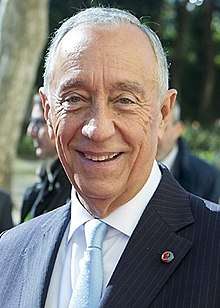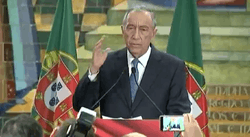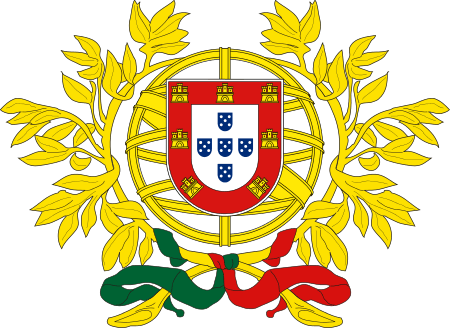Marcelo Rebelo de Sousa
| His Excellency Marcelo Rebelo de Sousa ComSE GCIH | |
|---|---|
 | |
| 20th President of Portugal | |
|
Assumed office 9 March 2016 | |
| Prime Minister | António Costa |
| Preceded by | Aníbal Cavaco Silva |
| President of the Social Democratic Party | |
|
In office 29 March 1996 – 1 May 1999 | |
| Preceded by | Fernando Nogueira |
| Succeeded by | José Manuel Barroso |
| Leader of the Opposition | |
|
In office 29 March 1996 – 1 May 1999 | |
| Prime Minister | António Guterres |
| Preceded by | Fernando Nogueira |
| Succeeded by | José Manuel Barroso |
| Minister of Parliamentary Affairs | |
|
In office 12 June 1982 – 9 June 1983 | |
| Prime Minister | Francisco Pinto Balsemão |
| Preceded by | Fernando Amaral |
| Succeeded by | António de Almeida Santos |
| Secretary of State for the Premiership | |
|
In office 4 September 1981 – 13 June 1982 | |
| Prime Minister | Francisco Pinto Balsemão |
| Preceded by | José Luís da Cruz Vilaça |
| Succeeded by | Leonor Beleza |
| Personal details | |
| Born |
Marcelo Nuno Duarte Rebelo de Sousa 12 December 1948 Lisbon, Portugal |
| Political party |
Independent (2015–present) Social Democratic Party (1975-2015) |
| Spouse(s) | |
| Domestic partner | Rita Amaral Cabral (1980–present) |
| Children | 2 |
| Relatives | Baltasar Rebelo de Sousa (Father) |
| Residence |
Belém Palace (official) Cascais (private) |
| Alma mater | University of Lisbon |
| Signature |
|
Marcelo Nuno Duarte Rebelo de Sousa (Portuguese pronunciation: [mɐɾˈsɛlu ˈnunu ˈdwaɾtɨ ʁɨˈbelu dɨ ˈsozɐ]), ComSE, GCIH (born 12 December 1948) is a Portuguese politician serving as the 20th and current President of Portugal since 9 March 2016.[1] Previously he was a government minister and member of parliament, a law professor, journalist, political analyst and pundit.
Background
Born in Lisbon, he is the eldest son of Baltasar Rebelo de Sousa (1921-2001) and his wife Maria das Neves Fernandes Duarte (1921-2003). He is named after his godfather, Marcelo Caetano, the last Prime Minister of the Estado Novo regime.
Early life and education
Rebelo de Sousa is a university graduate, Doctorate, Professor and Publicist specialized in Constitutional law and Administrative Law from the Faculty of Law of the University of Lisbon, where he taught Law.[2]
Party politics and media career
Rebelo de Sousa started his career during the Estado Novo as a lawyer, and later as a journalist. He joined the Popular Democratic Party, becoming a Deputy to the Assembly of the Republic. During that time, he helped draft Portugal's constitution in 1976.[3] Later he rose to Adjoint Minister of Prime Minister Francisco Pinto Balsemão. Together with him he was a Co-Founder, Director and Administrator of the Expresso newspaper, owned by Pinto Balsemão. He was also the Founder of Sedes and the Founder and President of the Administration Council of another newspaper, Semanário. He started as a political analyst and pundit on TSF radio with his Exams, in which he gave marks (0 to 20) to the main political players.
In 1989 he ran for Mayor of the Municipal Chamber of Lisbon (Mayor of Lisbon) but lost to Jorge Sampaio, though he did win a seat as City Councilor (Vereador). In that campaign he took a plunge into the waters of the Tagus River to prove they were not polluted despite claims to the contrary.
Leader of the PSD, 1996–1999
Rebelo de Sousa was leader of the Social Democratic Party from 31 March 1996 to 27 May 1999 (some weeks before his election as party leader, he declared he wouldn't be a leadership candidate, "not even if Christ came down to Earth"). He created a center-right coalition, the Democratic Alliance, with the People's Party in 1998. He became, however, the Vice-President of the European People's Party–European Democrats. The coalition didn't please large parts of its own party, due to the role the People's Party leader, Paulo Portas, had in undermining Cavaco Silva's government while director of the weekly O Independente.
Rebelo de Sousa resigned after Portas, in a TV interview, described a private talk they had had concerning this matter. Portas claimed Marcelo, as an anonymous source for O Independente, described in great detail a dinner where he wasn't present, down to the menu (which included vichyssoise, a cold soup); when Paulo Portas later reneged on the decision of the coalition established between their parties — which was made before that dinner — the term "vichyssoise" became a reference to that "revenge served cold". For these and other inconsistencies, he was called by Manuel Maria Carrilho political gelatin. A speech, in which he condemned the Portuguese habit of expecting a Messiah and a Dom Sebastião, was not well taken. The failure of the coalition led to his public and televised demission.
Post-leadership
In other local elections, he also became the President of the Municipal Assembly of Cascais and the President of the Municipal Assembly of Celorico de Basto.
He had a weekly program of political analysis every Sunday on public TV station RTP after previously having a similar program on the private TV station TVI, where he was introduced as being "the wisest and most perspicacious political analyst of current times". His comments covered everything from politics to sports, including his famous presentations and comments on the newest published books, and they were sometimes controversial, some of the comments being seen as personal and political attacks.
In his analysis, still in TVI, he often attacked Pedro Santana Lopes, accusing him of being "truculent, a cudgeller and resentful", and not "having the profile to be a President of the Republic". This animosity remained until after Santana Lopes became Prime Minister, with a particular commentary on his performance finishing with the statement that he was "worse than the worst Guterres" and that he was "making Guterres look better and pushing them to Belém", leading to a response from Santana Lopes' Government Speaker Rui Gomes da Silva, who accused him of an "involuntary cabal". The president of the network, Miguel Pais do Amaral, asked in a private dinner that Marcelo be more moderate in his attacks, something that Marcelo took as a form of censorship, leading to his exit from the program and the channel. It was after that episode that he was hired by RTP.
Partially in consequence of these events, President Jorge Sampaio dissolved the Assembly of the Republic, a move that also meant dismissing the Government at a time when it had a stable coalition majority, and calling for anticipated elections, which led to the defeat of Santana Lopes and the election of the Socialists under José Sócrates.

In 2010, he left RTP and returned to TVI to do the same program that he had before.
He was made a Member of the Council of State, by President Cavaco Silva, and was sworn-in on 6 April 2006.[4]
He was a leading figure on the pro-life side of the 2007 abortion referendum. He even founded a website titled "Assim Não" (Not like this), which was divulged with a famous introductory video.[5] It become so well known that it was parodied in Saturday Night Live-fashion by famous humour group Gato Fedorento.[6]
President of Portugal, 2016–present
On 24 January 2016, Rebelo de Sousa was elected as President of Portugal in the first round of voting. He stood as an independent, appealing for moderation and cross-party consensus.[7] During his election campaign, he promised to repair political divisions and the hardship of Portugal's 2011-14 bailout. Unlike his predecessor, Anibal Cavaco Silva, he had never previously held a top state position. He is the most popular President of the Republic since 1974.[8]
State visits

.jpg)
Marcelo Rebelo de Sousa, as President of Portugal, has visited the Vatican, Spain, Mozambique and Morocco. The first visit was to the Vatican City to meet the Pope Francis and the Cardinal Secretary of State Pietro Parolin.[9][10][11][12]
Health issues
On 28 December 2017, Marcelo Rebelo de Sousa was admitted at Curry Cabral Hospital, in Lisbon, where he was subjected to a surgery to treat an umbilical hernia.[13] The procedure was performed by Eduardo Barroso,[14] a veteran surgeon who is also a close friend of the President since early childhood. After the surgery, Barroso informed the press that all went well and that Marcelo's condition had been known for at least six years, also referring that the surgery was initially due to occur on 4 January 2018. However, on the morning of 28 December, the President felt abdominal pain, and an examination by his official physician, Daniel Matos, revealed that the hernia was incarcerated and required immediate surgery. On 29 December, the Presidency official website published a clinical report, informing that Marcelo was cheerful and recovering well.[15] Marcelo Rebelo de Sousa was discharged from hospital on 31 December by 12:45 PM, and left the premises by his own foot, while greeted and applauded by some hospital staff and other patients. He lauded the Portuguese National Health Service, considering it an important conquest of democracy.[16]
On 23 June 2018, Marcelo Rebelo de Sousa felt indisposed and collapsed after a visit to Bom Jesus do Monte sanctuary in Braga. He was transported to the hospital where, after several exams, it was revealed the incident was caused by a sudden drop in blood pressure alongside an acute gastroenteritis.[17] He was discharged from hospital later on the same day and was told to rest for some days.[18]
Distinctions
National orders



Foreign orders
- Member Special Class of the Order of Muhammad of the Kingdom of Morocco (Morocco, 27 June 2016)[20]











Personal life
On 27 July 1972, in the parish of São Bento do Mato in Évora, Rebelo de Sousa married Ana Cristina da Gama Caeiro da Mota Veiga, born in the parish of Santos-o-Velho in Lisbon, on 4 June 1950, daughter of António da Mota Veiga and Maria Emília da Gama Caeiro and current widow without issue of Jorge Manuel Vassalo Sors Lagrifa (7 May 1948 – 2 February 2005), maternal grandson of Manuel António Vassalo e Silva, with whom he had two children:
- Nuno da Mota Veiga Rebelo de Sousa (b. São Sebastião da Pedreira, Lisbon, 8 August 1973)
- Sofia da Mota Veiga Rebelo de Sousa (b. São Sebastião da Pedreira, Lisbon, 27 September 1976)
He separated later in 1980, but has never divorced due to his religious belief. He has started dating his former pupil, in the 1980s, who was at the time his fellow lecturer at the Faculty of Law of the University of Lisbon. They are still dating, but living separately.[28]
He claims to sleep only 4 to 5 hours daily. He also claims to read 2 books a day, and is an avid surfer at the Guincho Beach in Cascais. He has stated to be a fan of classical music, especially of Giuseppe Verdi.
References
- ↑ Reuters
- ↑ Teaching staff, Faculty of Law, University of Lisbon Archived 13 February 2008 at the Wayback Machine.
- ↑ Vince Chadwick (January 24, 2016), Portugal elects Rebelo de Sousa as president Politico Europe.
- ↑ "Presidente deu posse a novos membros do Conselho de Estado". Presidência da República Portuguesa. Retrieved 2018-02-03.
- ↑ Fendorento
- ↑ Fendorento
- ↑ Paul Ames (January 24, 2016), 5 takeaways from Portugal’s presidential election Politico Europe.
- ↑ Axel Bugge (March 9, 2016), "President says Portugal must respect EU, avoid return to crisis" Reuters.
- ↑ "Vaticano: Marcelo Rebelo de Sousa em audiência com o Papa Francisco". Agência Ecclesia (in Portuguese). 17 March 2016. Retrieved 29 June 2016.
- ↑ Ribeiro, Nuno (16 March 2016). "Marcelo inicia hoje visita oficial ao Vaticano e Espanha". Público (in Portuguese). Retrieved 29 June 2016.
- ↑ "Marcelo chegou a Moçambique". TVI (in Portuguese). 3 May 2016. Retrieved 29 June 2016.
- ↑ "Em Marrocos, a falar de energia, 'Brexit', Espanha e sanções". Público (in Portuguese). Lusa. 28 June 2016. Retrieved 29 June 2016.
- ↑ "Marcelo Rebelo de Sousa internado em Lisboa para ser operado de urgência". www.dn.pt (in Portuguese). Diário de Notícias. Retrieved 30 December 2017.
- ↑ "Marcelo operado por Eduardo Barroso". www.sabado.pt (in Portuguese). SÁBADO. Retrieved 30 December 2017.
- ↑ "Boletim Clínico do estado de saúde do Presidente da República". www.presidencia.pt (in Portuguese). Presidência da República. Retrieved 30 December 2017.
- ↑ "Marcelo Rebelo de Sousa já teve alta e foi aplaudido à saída". www.dn.pt (in Portuguese). Diário de Notícias. Retrieved 1 January 2018.
- ↑ "Marcelo sofre quebra de tensão e desmaia durante visita em Braga". www.jn.pt (in Portuguese). Jornal de Notícias. Retrieved 23 June 2018.
- ↑ "Nota da Presidência da República". www.presidencia.pt (in Portuguese). Presidência da República. Retrieved 23 June 2018.
- 1 2 "Cidadãos Nacionais Agraciados com Ordens Portuguesas". Página Oficial das Ordens Honoríficas Portuguesas. Retrieved 13 July 2016.
- ↑ HM the King, Portuguese President Hold Tête-à-Tête Talks - website of Ministry of Culture and Communication of the Kingdom of Morocco
- 1 2 "CIDADÃOS NACIONAIS AGRACIADOS COM ORDENS ESTRANGEIRAS". Página Oficial das Ordens Honoríficas Portuguesas. Retrieved 8 January 2017.
- ↑ Boletín Oficial del Estado
- ↑ Serbian and Portuguese presidents exchange decorations
- ↑ "CIDADÃOS NACIONAIS AGRACIADOS COM ORDENS ESTRANGEIRAS - Página Oficial das Ordens Honoríficas Portuguesas". www.ordens.presidencia.pt (in Portuguese). Retrieved 2018-02-22.
- ↑ Quirinale website
- ↑ "Real Decreto 223/2018, de 13 de abril, por el que se concede el Collar de la Real y Distinguida Orden Española de Carlos III al Excelentísimo señor Marcelo Rebelo de Sousa, Presidente de la República Portuguesa". Boletín Oficial del Estado (in Spanish) (91): 38968. 14 April 2018. ISSN 0212-033X. Retrieved 16 April 2018.
- 1 2 "CIDADÃOS NACIONAIS AGRACIADOS COM ORDENS ESTRANGEIRAS - Página Oficial das Ordens Honoríficas Portuguesas". www.ordens.presidencia.pt (in Portuguese). Retrieved 2018-07-27.
- ↑ "Quem é a mulher que não quer ser primeira-dama?". www.sabado.pt. Revista Sábado. Retrieved 12 March 2016.
- Costados Alentejanos, II, António Luís de Torres Cordovil Pestana de Vasconcelos, Edição do Author, Évora 2006, N.º 41
External links
| Wikimedia Commons has media related to Marcelo Rebelo de Sousa. |
| Government offices | ||
|---|---|---|
| Preceded by José Luís da Cruz Vilaça |
Secretary of State for the Premiership 1981–1982 |
Succeeded by Leonor Beleza |
| Preceded by Fernando Amaral |
Minister of Parliamentary Affairs 1982–1983 |
Succeeded by António de Almeida Santos |
| Political offices | ||
| Preceded by Fernando Nogueira |
Leader of the Opposition 1996–1999 |
Succeeded by José Manuel Barroso |
| Preceded by Aníbal Cavaco Silva |
President of Portugal 2016–present |
Incumbent |
| Party political offices | ||
| Preceded by Fernando Nogueira |
President of the Social Democratic Party 1996–1999 |
Succeeded by José Manuel Barroso |
